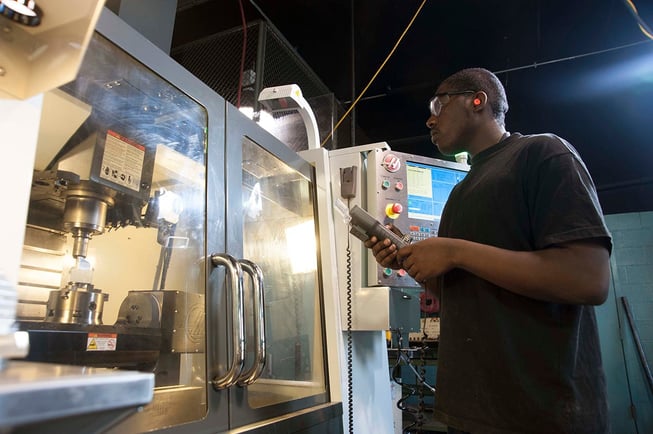

With a strong network of 58 community colleges spread throughout the state, every resident of North Carolina has access to higher education within 30 miles of their homes.
And while the twin mission of community colleges nationwide – affordability and accessibility – is noteworthy to people seeking a college degree, what your local community college can do for your business is of equal importance.
The North Carolina Community College System is among the strongest and most effective systems in the nation. Today, 40 percent of North Carolina wage earners have received education or training at a North Carolina community college during the last 10 years. According to the Economic Modeling Specialists International (EMSI), the accumulated contribution of former students totaled $19.6 billion in added state income, which is equivalent to creating more than 322,000 new jobs.
In North Carolina, businesses and government understand and embrace the key role community colleges play in producing a talented and well-trained workforce. State leaders have established a strong network of affordable institutions that have the facilities and curricula to grow the businesses and industries that drive the state economy.
Among the services community colleges provide business owners are:
For more than 50 years, businesses across North Carolina have called on their local community college to provide the specific skills training they need. The NCWorks Customized Training Program provides education, training and support services for new, expanding and existing business and industry in North Carolina. From interpersonal skills and team development to safety, regulatory compliance, and workplace organization, these trainings cover the critical issues managers often struggle with.

Community colleges work closely with business leaders and economic development officers to align their curricula with the up-to-the-minute needs of the industries in their region. For example, the College of the Albemarle offers FAA certified aircraft technician training at the Regional Aviation & Technical Training Center on the northern coast of Currituck County. Located just 30 miles from where the Wright brothers first took flight, this state-of-the-art facility offers Aviation Systems Technology and Computer Integrated Machining training and skills to support the region’s thriving aviation sector.
With thousands of talented, motived students earning their certificates and degrees from North Carolina community colleges each year, employers have no shortage of qualified employees to choose from.
One of the advantages of a community college is its flexibility in meeting the needs of business owners. In addition to offering cutting edge equipment, research materials, and high quality instruction in relevant subjects, community colleges know and understand the local economy.
Every community college in North Carolina features a small business center, providing business planning, trainings and workshops for people starting a new business. With real-world experience, faculty and administrators focus on how to make your business thrive in the industries that drive your regional economy.
Since 1963, North Carolina community colleges have been evolving their curricula and skills trainings to keep the state economy humming. Business owners who continue to take advantage of the training, talent, and resources available to them through their local community college find helpful and economical solutions to their challenges.
These Stories on Workforce Development
No Comments Yet
Let us know what you think